新视野大学英语2U6
新视野大学英语读写教程2 unit6 课文翻译
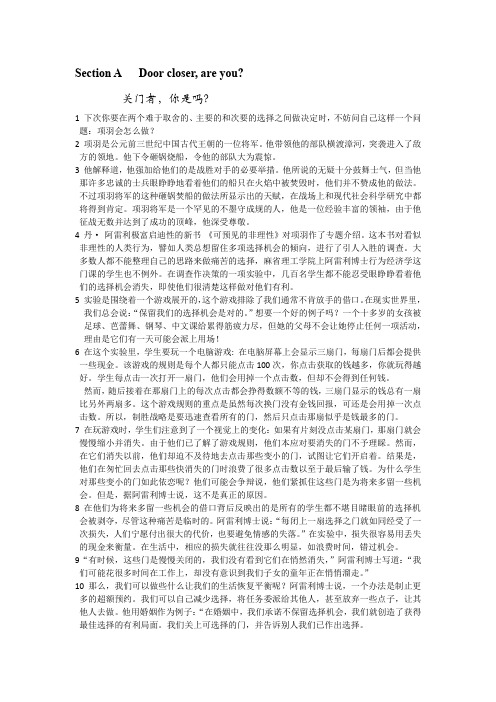
Section A Door closer, are you?关门者,你是吗?1 下次你要在两个难于取舍的、主要的和次要的选择之间做决定时,不妨问自己这样一个问题:项羽会怎么做?2 项羽是公元前三世纪中国古代王朝的一位将军。
他带领他的部队横渡漳河,突袭进入了敌方的领地。
他下令砸锅烧船,令他的部队大为震惊。
3 他解释道,他强加给他们的是战胜对手的必要举措。
他所说的无疑十分鼓舞士气,但当他那许多忠诚的士兵眼睁睁地看着他们的船只在火焰中被焚毁时,他们并不赞成他的做法。
不过项羽将军的这种砸锅焚船的做法所显示出的天赋,在战场上和现代社会科学研究中都将得到肯定。
项羽将军是一个罕见的不墨守成规的人,他是一位经验丰富的领袖,由于他征战无数并达到了成功的顶峰,他深受尊敬。
4 丹·阿雷利极富启迪性的新书《可预见的非理性》对项羽作了专题介绍。
这本书对看似非理性的人类行为,譬如人类总想留住多项选择机会的倾向,进行了引人入胜的调查。
大多数人都不能整理自己的思路来做痛苦的选择,麻省理工学院上阿雷利博士行为经济学这门课的学生也不例外。
在调查作决策的一项实验中,几百名学生都不能忍受眼睁睁看着他们的选择机会消失,即使他们很清楚这样做对他们有利。
5 实验是围绕着一个游戏展开的,这个游戏排除了我们通常不肯放手的借口。
在现实世界里,我们总会说:“保留我们的选择机会是对的。
”想要一个好的例子吗?一个十多岁的女孩被足球、芭蕾舞、钢琴、中文课给累得筋疲力尽,但她的父母不会让她停止任何一项活动,理由是它们有一天可能会派上用场!6 在这个实验里,学生要玩一个电脑游戏: 在电脑屏幕上会显示三扇门,每扇门后都会提供一些现金。
该游戏的规则是每个人都只能点击100次,你点击获取的钱越多,你就玩得越好。
学生每点击一次打开一扇门,他们会用掉一个点击数,但却不会得到任何钱。
然而,随后接着在那扇门上的每次点击都会挣得数额不等的钱,三扇门显示的钱总有一扇比另外两扇多。
新视野大学英语第二册unit_6_课件
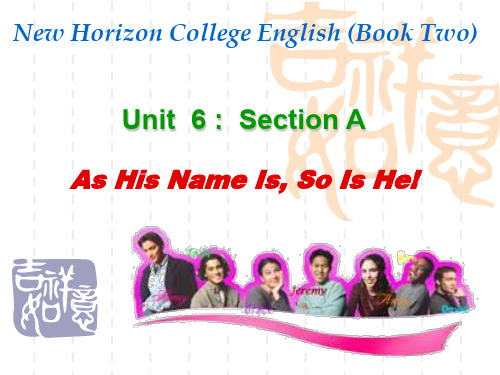
Part I (1-3)
By citing a typical example of a woman’s experience concerning her names, the author directs the reader’s interest to the topic.
Text Analysis
1) performance of girls with appealing names and less appealing names;
2) popularity of the girls is related to their names;
Result: better
Part Three
Then based on the analysis of the effects of names on life in the second part, the author naturally arrives at his conclusion in the third part.
If you don’t feel like your name, change it.
Debate
Do you really agree with the author’s opinion?
Have you ever thought about changing your name into a more attractive one?
toward life.
Throughout history
Names
+ the Bible identify
Webster’s Dictionary
describe
As his name is, so is he! (人如其名)
新视野大学英语读写教程2unit6范文

新视野大学英语读写教程2unit6范文1In the New Horizon College English Reading and Writing Course 2, Unit 6, there are several crucial points that deserve our in-depth exploration! The key sentence patterns like “It is + adj. + for sb. to do sth.” provide a clear and straightforward way to express an opinion or a fact. For instance, “It is important for us to learn English well.” This structure helps us convey ideas precisely and effectively.The grammar structures, such as the use of present perfect tense, add complexity and accuracy to our language. Take “I have learned a lot from this unit.” as an example. It indicates an action that started in the past and has some connection to the present.The important vocabulary in this unit expands our word bank and enriches our expression. Words like “accomplish” and “perseverance” are powerful tools to describe achievements and determination.By understanding and mastering these key elements, we can significantly enhance our English language skills and express ourselves more fluently and precisely. How amazing and useful these knowledge points are! Don't you think so? Let's keep learning and improving to reach a higher level of English proficiency!2Oh my goodness! Have you ever wondered how the knowledge we acquire from textbooks can light up our real-life experiences? Let me tell you about a remarkable journey I had. I embarked on a trip to a charming mountain village. As I reached the destination, I exclaimed, "Wow! What a breathtaking view!" The mountains stood tall and majestic, just like the words in our textbook. I used the vocabulary I learned to describe the lush forests and the clear streams. The grammar points also helped me express my excitement vividly. "How wonderful it is to be here!" I thought. I saw local farmers working diligently in the fields, and I couldn't help but wonder, "How do they manage to cultivate such fertile land?" The entire experience was not only a leisure escape but also a practical application of what I had studied. Isn't it amazing how our learning can enhance our perception of the world around us? So, let's keep exploring and applying what we learn to make our lives more colorful and meaningful!3In the context of the "New Horizon College English Reading and Writing Course 2 Unit 6", one prominent theme that emerges is the evolving nature of cultural identities in a globalized world. This topic holds immense significance and deserves a profound analysis! How do we define and redefine our cultural identities in the face of rapid cross-culturalexchanges? Take, for instance, the phenomenon of cultural fusion. We witness elements from different cultures blend seamlessly in various aspects of life - from fashion and cuisine to art and music. But does this mean we lose our roots? Absolutely not! It rather enriches our understanding and appreciation of the diverse world we live in. The unit also brings to light the challenges that come with maintaining the essence of one's native culture while embracing new influences. Isn't it a delicate balance that requires conscious effort and reflection? We must ask ourselves: How can we preserve our cultural heritage while opening our arms to the waves of globalization? This is not just a theoretical question but a practical concern that affects our daily lives and the future of our societies. The exploration of such themes in the unit urges us to think critically and act responsibly in this ever-changing cultural landscape.4Oh my goodness! Let me take you on an amazing journey through the New Horizon College English Reading and Writing Course 2 Unit 6 in a truly innovative way. Imagine if the lessons were transformed into a hilarious dialogue between two characters. Here it goes!A: "Hey, have you noticed the key points in Unit 6?"B: "Oh, you mean those complex grammar rules and vocabulary?"A: "Exactly! But don't you think it could be fun if we make it like a story?"B: "Wow, that's a brilliant idea! Like, what if we were characters in a magical world and had to use these knowledge to solve problems?"A: "Oh, that would be so cool! For instance, when facing a tricky monster, we could use the new words to describe it and the grammar to explain our strategies!"B: "Can you believe how much these lessons can expand our minds? It's like opening a door to a whole new world of language!"A: "Yes! And it's not just about learning, it's about having fun while doing it. Isn't that amazing?"Isn't it fascinating how we can make learning so enjoyable and creative? I truly believe that this kind of approach can make us master the knowledge in Unit 6 more easily and effectively. So, let's embrace this fun way and keep exploring the wonderful world of English!5The "New Horizon College English Reading and Writing Course 2 Unit 6" offers a profound exploration into the realm of language and communication. This unit presents various language phenomena that deserve in-depth analysis from an academic perspective. For instance, consider the complexity of lexical choices and their impact on the conveyance of meaning. Language学家Noam Chomsky's theory of generative grammar could shed light on this aspect! How do the rules and structures of language shape our expressions and understanding?Moreover, the unit's focus on different text types and their specific features poses interesting questions. Why do certain types of texts require a more formal language style, while others allow for greater informality? The study of pragmatics comes into play here, as it examines how context influences language use.In conclusion, this unit provides a wealth of material for scholarly examination. It prompts us to think critically about language and its multifaceted nature. Isn't it fascinating how language works and how we can master it more effectively through such studies?。
新视野大学英语第二册第六单元
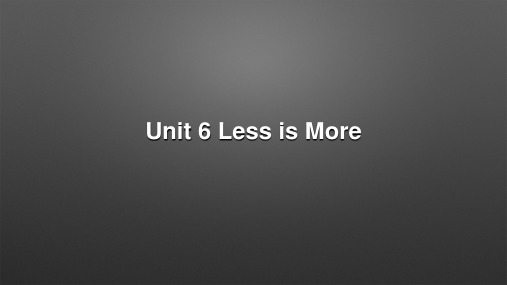
Xiang Yu was a Chinese imperial general in the third century BC who took his troops across the Zhang River on a raid into enemy territory. To his troops’ astonishment, he ordered their cooking pots crushed and their sailing ships burned.
Dr. Ariely : behavioral economics
• 2) Minimalism means to live with less, to basically declutter your life.
• 3) Minimalism is also a term used in design when you use very few elements to convey your idea.
Xiang Yu was a Chinese imperial general in the third century BC who took his troops across the Zhang River on a raid into enemy territory. To his troops’ astonishment, he ordered their cooking pots crushed and their sailing ships burned.
新视野英语第二册课文翻译Unit6
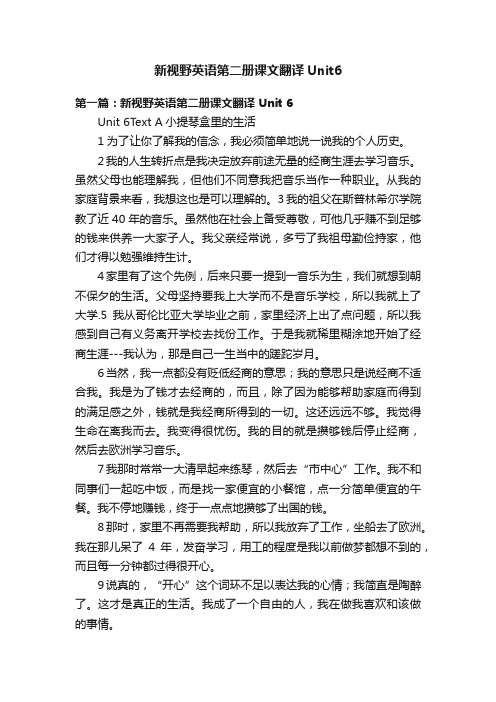
新视野英语第二册课文翻译Unit6第一篇:新视野英语第二册课文翻译 Unit 6Unit 6Text A小提琴盒里的生活1为了让你了解我的信念,我必须简单地说一说我的个人历史。
2我的人生转折点是我决定放弃前途无量的经商生涯去学习音乐。
虽然父母也能理解我,但他们不同意我把音乐当作一种职业。
从我的家庭背景来看,我想这也是可以理解的。
3我的祖父在斯普林希尔学院教了近40年的音乐。
虽然他在社会上备受尊敬,可他几乎赚不到足够的钱来供养一大家子人。
我父亲经常说,多亏了我祖母勤俭持家,他们才得以勉强维持生计。
4家里有了这个先例,后来只要一提到一音乐为生,我们就想到朝不保夕的生活。
父母坚持要我上大学而不是音乐学校,所以我就上了大学.5我从哥伦比亚大学毕业之前,家里经济上出了点问题,所以我感到自己有义务离开学校去找份工作。
于是我就稀里糊涂地开始了经商生涯---我认为,那是自己一生当中的蹉跎岁月。
6当然,我一点都没有贬低经商的意思;我的意思只是说经商不适合我。
我是为了钱才去经商的,而且,除了因为能够帮助家庭而得到的满足感之外,钱就是我经商所得到的一切。
这还远远不够。
我觉得生命在离我而去。
我变得很忧伤。
我的目的就是攒够钱后停止经商,然后去欧洲学习音乐。
7我那时常常一大清早起来练琴,然后去“市中心”工作。
我不和同事们一起吃中饭,而是找一家便宜的小餐馆,点一分简单便宜的午餐。
我不停地赚钱,终于一点点地攒够了出国的钱。
8那时,家里不再需要我帮助,所以我放弃了工作,坐船去了欧洲。
我在那儿呆了4年,发奋学习,用工的程度是我以前做梦都想不到的,而且每一分钟都过得很开心。
9说真的,“开心”这个词环不足以表达我的心情;我简直是陶醉了。
这才是真正的生活。
我成了一个自由的人,我在做我喜欢和该做的事情。
10如果一直经商的话,我今天可能已经是一个真正的有钱的人了。
然而,我并不认为那样的生活会是成功的。
我可能放弃掉了金钱所无法买到的幸福---当一个的主要目标是赚钱时,这种幸福往往就被放弃掉了。
新视野大学英语第二册第六单元
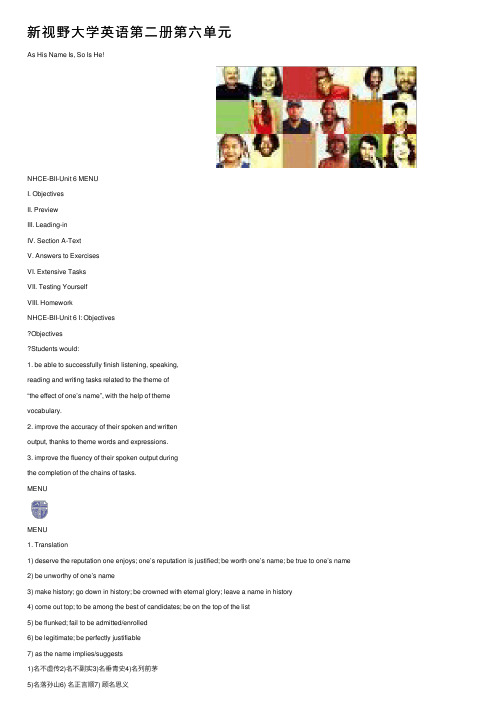
新视野⼤学英语第⼆册第六单元As His Name Is, So Is He!NHCE-BII-Unit 6 MENUI. ObjectivesII. PreviewIII. Leading-inIV. Section A-TextV. Answers to ExercisesVI. Extensive TasksVII. Testing YourselfVIII. HomeworkNHCE-BII-Unit 6 I: ObjectivesObjectivesStudents would:1. be able to successfully finish listening, speaking,reading and writing tasks related to the theme of“the effect of one’s name”, with the help of themevocabulary.2. improve the accuracy of their spoken and writtenoutput, thanks to theme words and expressions.3. improve the fluency of their spoken output duringthe completion of the chains of tasks.MENUMENU1. Translation1) deserve the reputation one enjoys; one’s reputation is justified; be worth one’s name; be true to one’s name2) be unworthy of one’s name3) make history; go down in history; be crowned with eternal glory; leave a name in history4) come out top; to be among the best of candidates; be on the top of the list5) be flunked; fail to be admitted/enrolled6) be legitimate; be perfectly justifiable7) as the name implies/suggests1)名不虚传2)名不副实3)名垂青史4)名列前茅5)名落孙⼭6) 名正⾔顺7) 顾名思义2. Name connotationsDebbie (f.)represents the personalitycharacteristics of generous, understanding,honest, creative, and intense.Lynne (f.)or Lynn (m.)represents thepersonality characteristics of sensitive, deeplyartistic and creative, intense, and nature-loverand comes from Welsh meaning “lake” or is ashort form of Linda(Spanish), or Belinda(Italian), both meaning “beautiful.”MENUSusan (f.)represents the personality characteristics of pleasant, easy-going, friendly, patient, social,cautious and is a short form of Susanna.Harry (m.)represents the personality characteristics of individual, reserved, serious, stubborn, alone, loyal, and thoughtful.MENUJoe (m.)represents the personality characteristics of spontaneous, social, easy-going, warm, generous, lacking in initiative.Adrian (m.) represents the personalitycharacteristics of diplomatic, friendly, lacking inenergy, confidence and initiative.Nigel (m.)represents the personality characteristics of imaginative, creative, inconsistent, insecure,talkative.MENUBertha (f.)represents the personality characteristics of idealistic, generous, kind, caring, possessive and comes from German, meaning “bright, famous”. Bertha is well known in Germanlegends as a character who sneaks into nurseries and rocks children to sleep.Pope Mel is a humorous reference, meant to show how foolish it would be to put the two names together. “Pope” is a title given to the highest authority of the Roman Catholic Church in Rome.“Mel” is possibly a short form of either Melvin (m.),or Melanie(f.)or Melissa (f.),and is a playful name which has no meaningin and of itself.MENU3. PresentationCan you tell a story about your name?MENU1. Talk about Your nameMENUMENU2. Questions1) Why does a person need a name?For example, there are 50 students in the class, how to distinguish this one from that one?Reference identify, signs, social life, distinguish So names are used to identify people. They are used as signs in social life todistinguish one person from another.MENU2) Why doesn’t a person just use anumber as his name?Here, please look at these names:1) 韩建军;赵国庆What about these two names? What do they tell us?Of course, we may guess something from these twonames: the birth of the two persons. The first one may be born on 1st, August and the second may be born on 1st, October.2) What about these two names?周传雄;周海媚Even though they have the same family name,we know the first one is a man and thesecond one is a woman. Why? Because in Chinese traditional culture, the letter 雄, which means that someone is strong, is used tostand for a man, while the letter 媚is used fora woman for it means that someone is prettyand attractive.MENU3) What about these two names?李嘉欣;李嘉诚From the first name, we may imagine abeautiful girl who is pleasant, easy-going and attractive. From the second name, we mayimage a man who is honest, reliable and responsible. In fact the first name is a nameof an actress and the second name is one ofa successful businessman.MENUAccording to what we have discussed, we know names can be used to describe people.MENU3) But these are not enough. Names can make a great difference to a person. Can you give some examples? Therefore, names can affect people. MENUMENU4) When you see the following twonames, what do you think about thetwo persons?⼘世仁娄阿⿏The first name may tell us this person is cruel and people may hate him when listening to his name. And the second name may imply this one is like a thief or a humble man because in Chinese ⿏refers to a mouse which often steals food from people’s house.Therefore, names can not only leave good impression or add our confidence, but also convey more information.But these are only our imagination. We do not know these two persons. Why do we have such kind of impressions? Because of their names. So we tend to hold prejudice to people by their names.MENU。
新视野大学英语第二册unit-6-课件ppt教材
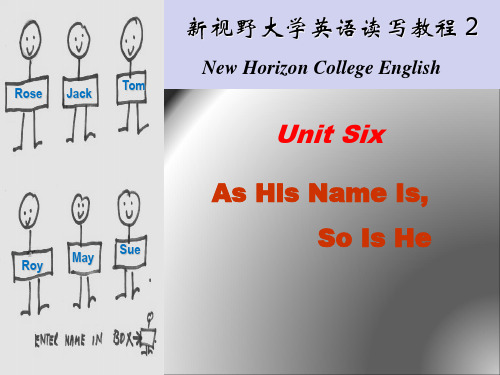
• The design has many applications.
【结构】句中 if only 不是表达“但愿”之意,如在 “If only I had a million dollars” 中。这里if是一个连
词,意为“虽然,即使”。
【例句】It is a nice house, if a little expensive.
这房子不错, 虽说价钱高了点。 【译文】但是它肯定给她带来了好处,虽说改名仅使她对自
I think it’s a good idea to …
It may help if … I am considering to … The reasons I decide
to … are as follows: Firstly, … Secondly, … Finally, …
No
I disagree with the author’s opinion that … I don’t think it’s a good idea to … It is impossible to … I will never … My reasons are as follows: The best to … is … The most important thing is …
3承)noTo认ntrlayb吧neb:ssylua难trhpt道eiroiss你nueg.d遇gwe到shtei一onn个tho叫efyt奈hme杰iere儿tnao的mne木e.s.匠时你不
感到惊讶?遇到一个叫伯莎的物理学家或是梅尔 教皇呢?我们常常把由名字引起的看法强加到他 人身上 ······
戴安娜王妃优雅的举止总是留在人们的记忆中。
新视野大学英语2 Unit 6
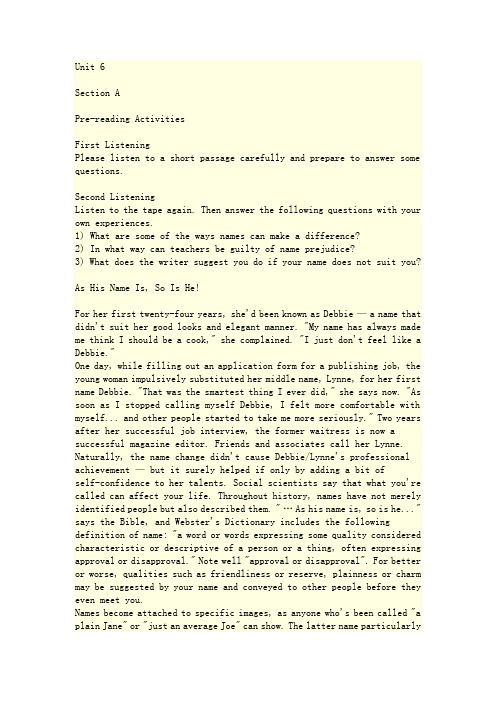
Unit 6Section APre-reading ActivitiesFirst ListeningPlease listen to a short passage carefully and prepare to answer some questions.Second ListeningListen to the tape again. Then answer the following questions with your own experiences.1) What are some of the ways names can make a difference?2) In what way can teachers be guilty of name prejudice?3) What does the writer suggest you do if your name does not suit you?As His Name Is, So Is He!For her first twenty-four years, she'd been known as Debbie —a name that didn't suit her good looks and elegant manner. "My name has always made me think I should be a cook," she complained. "I just don't feel like a Debbie."One day, while filling out an application form for a publishing job, the young woman impulsively substituted her middle name, Lynne, for her first name Debbie. "That was the smartest thing I ever did," she says now. "As soon as I stopped calling myself Debbie, I felt more comfortable with myself... and other people started to take me more seriously." Two years after her successful job interview, the former waitress is now a successful magazine editor. Friends and associates call her Lynne. Naturally, the name change didn't cause Debbie/Lynne's professional achievement — but it surely helped if only by adding a bit ofself-confidence to her talents. Social scientists say that what you're called can affect your life. Throughout history, names have not merely identified people but also described them. " … As his name is, so is he..." says the Bible, and Webster's Dictionary includes the following definition of name: "a word or words expressing some quality considered characteristic or descriptive of a person or a thing, often expressing approval or disapproval." Note well "approval or disapproval". For better or worse, qualities such as friendliness or reserve, plainness or charm may be suggested by your name and conveyed to other people before they even meet you.Names become attached to specific images, as anyone who's been called "a plain Jane" or "just an average Joe" can show. The latter name particularlybothers me since my name is Joe, which some think makes me more qualified to be a baseball player than, say, an art critic. Yet, despite this disadvantage, I did manage to become an art critic for a time. Even so, one prominent magazine consistently refused to print "Joe" in my by-line, using my first initials, J.S., instead. I suspect that if I were a more refined Arthur or Adrian, the name would have appeared complete.Of course, names with a positive sense can work for you, even encourage new acquaintances. A recent survey showed that American men thought Susan to be the most attractive female name, while women believed Richard and David were the most attractive for men. One woman I know turned down a blind date with a man named Harry because "he sounded dull". Several evenings later, she came up to me at a party, pressing for an introduction to a very impressive man; they'd been exchanging glances all evening. "Oh," I said. "You mean Harry." She was ill at ease.Though most of us would like to think ourselves free from such prejudiced notions, we're all guilty of name stereotyping to some extent. Confess: Wouldn't you be surprised to meet a carpenter named Nigel? A physicist called Bertha? A Pope Mel? Often, we project name-based stereotypes on people, as one woman friend discovered while taking charge of a nursery - school's group of four-year olds. "There I was, trying to get a little active boy named Julian to sit quietly and read a book — and pushing a thoughtful creature named Rory to play ball. I had their personalities confused because of their names!"Apparently, such prejudices can affect classroom achievement as well. In a study conducted by Herbert Harari of San Diego State University, and John McDavid of Georgia State University, teachers gave consistently lower grades on essays apparently written by boys named Elmer and Hubert than they awarded to the same papers when the writer's names were given as Michael and David. However, teacher prejudice isn't the only source of classroom difference. Dr. Thomas V. Busse and Louisa Seraydarian of Temple University found those girls with names such as Linda, Diane, Barbara, Carol, and Cindy performed better on objectively graded IQ and achievement tests than did girls with less appealing names. (A companion study showed girls' popularity with their peers was also related to the popularity of their names — although the connection was less clear for boys.)Though your parents probably meant your name to last a lifetime, remember that when they picked it they'd hardly met you, and the hopes and dreams they valued when they chose it may not match yours. If your name no longer seems to fit you, don't despair; you aren't stuck with the label. Movie stars regularly change their names, and with some determination, you can, too.Words: 752NEW WORDSeleganta. tasteful in appearance or manner 优雅的,文雅的,精致的applicationn. 1. [U, C] official request 申请,请求2. [U, C] act of putting a theory, discovery, etc. to practical use 应用,使用,运用substitutevt. put or use sb./sth. to replace sb./sth. else 代替,替换,代用vi. act or serve as a replacement 代替,代用n. [C] a person or thing that replaces, acts for or serves as sb. or sth. else 代理人,代替的人,代用品,代用物naturallyad. 1. of course; as might be expected 当然,预料中地2. by nature 天性,天生confidencen. 1. [U] feeling of certainty; trust in one's own ability 信心,自信2. [U] trust (in sb., in sb.'s ability, or in what is said, reported, etc.) 信赖,信任,相信self-confidencen. [U] trust in oneself; trust in one's own abilities 自信talentn. 1. [C, U] special or great ability 天才,才能2. [U] people who have (a) talent 有才干的人,人才biblen. 1. [U] (B-) 《圣经》2. [C] any official book supported by authorities 公认为权威的典籍definitionn. 1. [C] a statement that gives the exact meaning (of words, etc) 定义,释义2. [U] clearness of shape, sound, color, etc. 清晰度characteristica. representative 特有的,独特的n. [C] a special quality 特点,特征approvaln. [U] feeling or showing or saying that one thinks sth. is good or satisfactory 赞成,同意,批准,认可disapprovaln. [U] feeling that sth. or sb. is bad or wrong, etc. 反对,不赞成reserven. 1. [U] the habit of not showing one's feelings or thoughts 矜持,拘谨2. [C, U] thing kept for later use 留待以后用的东西,储备量vt. 1. keep sth. for a particular purpose or time 保留,留出,储备2. order (seats, accommodation, etc.) for use by a particular person ata future time 预定或保留(座位、席位),登记specifica. 1. detailed and exact 具体的,明确的2. relating to one particular thing, etc.; not general 特有的,特定的lattera. 1. being the second of two people, things or groups mentioned before (两者中的)后者的2. near to the end of a period 后面的n. (the~) the second of two things or people already mentioned 后者qualifyv. have or give (sb.) the qualities, training, etc. that are suitable or necessary (for sth.) (使)具有资格,(使)合格criticn. [C] a person who describes and judges the quality of sth., esp. works of art, music, etc.(文学、艺术、音乐)评论家,批评家prominenta. 1. important; well-known 重要的;杰出的,显著的,著名的2. sticking out from a surface 突出的,凸起的■by-linen. [C] a line at the beginning or end of an article in a newspaper, etc. giving the writer's name (报刊文章首、尾处的)作者署名refinevt. 1. make (sb./sth.) more elegant 使文雅,使高尚2. make pure or improve esp. by removing unwanted material 提炼,精炼acquaintancen. 1. [C] a person whom one knows but who is not a close friend 相识的人2. [U] (often slight) knowledge of sb./sth. 了解attractivea. very pleasing in appearance or sound, or causing interest or pleasure 动人的,引人入胜的,富有吸引力的impressivea. having a strong effect on sb. 使人印象深刻的▲stereotypevt. form a fixed set of ideas that is generally disapproving about the characteristics of a certain group of people or things 对……形成固定看法n. [C] an image, idea, character, etc. that has become fixed in a routine form 固定的形象,陈规,老套,旧框框extentn. 1. the degree specified 程度2. [U] length; area; range 长度;面积;范围confessv. 1. admit often unwillingly 承认2. admit that one has done sth. wrong, esp. when what you have done is secret 坦白,供认carpentern. [C] a person whose job is making or repairing wooden things 木匠,木工physicistn. [C] an expert in or student of physics 物理学家,研究物理学的人▲popen. [C] (usu. the P-) (天主教)教皇nurseryn. 1. [C] a place where children are cared for, usu. while their parents are at work, etc. 托儿所2. [C] a place where plants and trees are grown 苗圃thoughtfula. 1. thinking deeply 深思的,思考的2. showing care for the need of others 体贴的,关心的,考虑周到的creaturen. 1. [C] a living being, esp. an animal 生物,动物2. [C] (often used after an adjective) a person 人awardvt. give esp. as the result of an official decision 授予,给予n. [C] sth. awarded 奖金,奖品objectivea. not influenced by personal feelings; fair 不受个人感情影响的,客观的,公正的n. [C] a thing aimed at or wished for; purpose 目标,目的objectivelyad. in an objective manner 客观地,客观上地■IQn. [C, U] intelligence quotient, a comparative measure of a person's intelligence 智商intelligencen. [U] (good) ability to learn, reason, and understand 智力,智慧,理解力quotientn. a number which is the result when one number is divided by another 商数,商despairvi. have lost all hope 失望,绝望n. 1. [U] state of having lost all hope 失望,绝望2. [C] a person who makes other people give up hope 令人感到不可救药的人labeln. 1. [C] a descriptive word or words applied to a person, group, etc. (用以形容人、团体等的)称号,外号2. [C] a piece of paper, cloth, metal, etc. on or beside an object and describing its nature, name, owner, etc. 标签,签条vt. 1. describe sb./sth. 把……称为2. put a label or labels on sth. 把标签贴在……上,用标签标明determinationn. 1. [U] firmness of objective 决心,坚定,决断力2. [U] exact fixing (of sth.); deciding 决定,确定PHRASES AND EXPRESSIONSfill outadd what is necessary to make sth. complete 填写for better or worsewhether the result is good or bad 不管结果好坏convey tomake (ideas, feelings, etc.) known to another person 表达(思想、感情);转达attach sth. to sth.connect sth. with sth. 使与……相关联even soin spite of that 虽然这样,然而,不过turn downrefuse to consider 拒绝,驳回blind datearrangement to meet made between a man and a woman who have not met each other before (由第三方安排的)男女间初次见面come up tomove towards 走近,移近press for sth.make repeated and demanding request for sth. 反复请求,紧急请求be ill at easeuncomfortable; embarrassed 不自在;困窘free fromnot influenced or damaged by sth. dangerous 不具……的,未受危险伤害的be guilty ofbe to blame for sth. 对……有罪责take charge oftake control of; become responsible for 负责管理;对……负责stick with sth.keep staying with sth., cannot get rid of sth. 坚持;无法摆脱PROPER NAMESDebbie戴比Lynne林恩Webster韦伯斯特Joe乔Adrian艾德里安Susan苏珊Harry哈里Nigel奈杰尔Bertha伯莎Pope Mel梅尔教皇Julian朱利安Rory罗里Herbert Harari赫伯特·哈拉里San Diego圣迭戈(美国加利福尼亚州西南部港市)John McDavid约翰·麦克戴维Elmer埃尔默Hubert休伯特Michael迈克尔Thomas V. Busse托马斯·V·布塞Louisa Seraydarian路易莎·瑟拉里达里安Linda琳达Diane黛安Barbara芭芭拉Carol卡罗尔Cindy辛迪Section BJudge by AppearancesA standard criticism of sociological research is that it goes to great lengths to prove what most people with common sense already know. Without exactly taking sides for or against that criticism, I want to describe a sociological exercise that might seem to validate it — except that, for me and a classmate (and maybe for some who read this account), the experience made a common claim come alive.During spring break from a local college, my friend and I went downtown to shop. First, however, we made ourselves virtually unrecognizable to our friends and even to our families. We wore clothing slightly inappropriate for the weather, clean but not ironed, clearly not the styles worn by most visitors to the area. We carried plastic bags of nameless possessions. Both of us were slightly untidy. My friend wore a faded cotton shirt over a T-shirt and a wrinkled skirt over sweat pants.I wore a wool hat that concealed my hair and an unfashionable coat and glasses with sun shades that clipped on.The aim was to look like street people and to observe what difference that made in the way other people responded to us — whether the appearance of poverty would invite prejudice on us. We were also prepared to act out some mildly unusual behavior that might speak of some emotional problems, without appearing seriously disturbed or dangerous. As it turned out, there was no need for dramatics; people turned us off or tuned us out on the basis of appearance alone.Our first stop (after parking our cars near the railroad tracks) was in the bargain store of a local charity, where we politely asked access to a bathroom and were refused. Next we entered the lobby of a large hotel, where we asked for a coffee shop and a bathroom. The door man said, "You must go to the twentieth floor." We weren't up to trying our act at an exclusive restaurant, so we wandered around the first floor and left. From there we went to a second-hand shop, where we more or less blended with the customers, and then on to the upper-scale stores and coffee shops during the lunch hour.It was prejudice time. Some of the children we encountered stared, pointed, and laughed; adults gave us long, doubting looks. Clerks in stores followed our track to watch our every move. In a lunchroom a second assistant hurried to the side of the cashier, where they took my $2 check without asking for ID; it seemed worth that price to have us out the door. At one doorway a clerk physically blocked the entrance apparently to discourage our entry.We had money to cover small purchases, and, apart from wearing down-scale clothing, we did nothing in any of these settings to draw attention to ourselves; we merely shopped quietly in our accustomed manner. At one establishment we did blow our cover when we ordered French rolls with two special coffees; that may have been too far out of character for "bagladies". Elsewhere we encountered ribbing, imitating, lack of trust, and rude stares.So what did we learn? Mostly what we expected, what everybody knows: people judge by appearances. Just looking poor brings with it prejudice, accompanied by removal of much of the social grace most of us take for granted. Lacking the culturally acceptable symbols of belonging in this setting, we became, to a degree, objects, with less inherent dignity as persons.There was, however, one surprise — more accurately, a shock. It became clear most strongly at the shop I mentioned earlier, the one where a clerk conspicuously positioned herself in the entrance on seeing us. I had just noticed the place and had turned to my companion, saying, "I've never seen this store. Let's go in." She looked at me with alarm: "You're not really going there, are you?"I knew what she meant and shared her feeling. The place felt out of bounds for us. In a very few hours, we found ourselves accepting and internalizing the superficial and prejudiced judgments of ourselves that prevailed among the people we met; we catalogued ourselves. Undoubtedly, it's a good lesson to learn, maybe especially for sociologists.Words: 703NEW WORDS▲sociologyn. [U] scientific study of the nature and development of society 社会学sociologicala. of sociology 社会学的,有关社会学的sociologistn. [C] a student or expert in sociology 研究社会学的人,社会学家valida. 1. (of views or reasons, etc.) well based (指证明、理由)有充分根据的,合情合理的,健全的2. lawfully effective 有效的,具有法律效力的validatevt. make sth. well based 证实virtuallyad. in every important respect; almost 实际上,事实上,实质上;几乎a. arranged in order 整洁的,整齐的v. make sb./sth./oneself tidy (使)整洁,(使)整齐untidya. not tidy 不整洁的,邋遢的,凌乱的,混乱的▲wrinklev. (cause sth.) to form small lines (使)起皱纹n. [C] a small line in the skin, esp. one of those on the face that are caused by age 皱纹sweatn. [U] natural liquid which comes through the skin when one is hot, ill, afraid, working hard, etc. 汗vi. produce sweat, when hot, ill, afraid, or working hard 出汗,流汗pantsn. 1. (pl.) 长裤,(宽松的)便裤2. 内裤wooln. 1. [U] fine soft hair that forms the coats of sheep and goats 羊毛2. [U] thread or cloth made from this 毛线,毛料concealvt. keep sth./sb. from being seen or known about; hide sth./sb. 隐藏,隐蔽,隐瞒▲clipvt. 1. hold sth. together with devices 别在……上,夹住2. cut sth. with scissors or some sharp tool to make it tidier 剪短,修剪n. [C] a small metal or plastic object used for tying things together or holding them in position 夹子,别针povertyn. [U] state of being poor 贫穷,贫困milda. 1. not deeply felt or seriously intended 轻微的,不严重的2. (of a person or his manner) gentle; soft (指人或其举止)温和的,温柔的,和善的ad. 1. slightly, not deeply or seriously 轻微地2. in a gentle manner 温和地emotionala. 1. of the strong feelings of any kind 情感的,情绪的,感情的2. causing or showing strong feelings 引发或表现强烈感情的railroadn. [C] railway 铁路charityn. 1. [C] a society or organization for helping people 慈善机构2. [U] (generosity in) giving money, food, help, etc. to the people who are in need; help given in this way (慷慨)施舍;捐助,救济款exclusivea. 1. (of a high-class shop, goods sold in it, etc.) not found elsewhere; reserved for the rich 奢华的,高级的2. limited to only one person or group of people 专一的,惟一的,独用的n. [C] a story which is printed in one newspaper or magazine and no others 独家新闻,独家专文wandervi. 1. move around in an area or go from place to place without any special purpose 漫游,漫步,闲逛2. (of a person or an animal) leave the right place or way(指人或动物)离群,迷失方向blendv. mix or combine together (使)混和,(使)混杂,(使)交融n. [C] a combination of different kinds 混合物scalen. 1. [C] a method of dividing people based on how big, important, rich, etc. they are 等级,级别2. [U, C] relative size, extent, etc. 规模,大小upper-scalea. high-class 上流的,高档的down-scalea. low-class 下等的,低档的IDn. [U] identification, way of proving who one is; official papers that do this 身份证明,证明身份的证件▲identifi cationn. [U] the act of proving or showing the identity of sb. or sth. 鉴定,验明,认出discouragevt. 1. try to stop; persuade sb. not to do sth. 设法阻止,劝阻2. make sb. feel less confident or less willing to do sth. 使泄气,使不想干entryn. 1. [C] the act of coming or going in 进入,入场2. [C] a person or thing taking part in a race or competition 参加比赛的人或物ribvt. make fun of (sb.) in a friendly way 开玩笑,取笑imitatevt. 1. copy the speech, actions, dress, etc. of sb.; take or follow as an example 模仿,效仿2. produce a copy of the real thing 仿制,仿造rudea. 1. (of a person or his manner) showing no respect; impolite (指人或其行为)无礼的,不礼貌的,粗野的2. simple or simply made 简陋的,欠加工的accompanyvt. 1. happen with sth. 伴随,和……一起发生2. walk or travel with sb. 伴随,陪伴,陪同gracen. 1. (pl.) pleasing act or manner 风度2. [U] quality of simple elegant beauty (esp. in smoothly controlled movement) 优美,优雅vt. give honor to sb./sth. 给……增光symboln. 1. [C] an object that represents sth. because it is connected with itin a lot of people's minds 代表物,象征物2. [C] an image, object, etc. that suggests or refers to sth. else 象征,标志3. [C] a mark or sign with a particular meaning 记号,符号▲ inherenta. existing as a natural or born quality of sb./sth. 固有的,与生俱来的▲dignityn. 1. [U] calm or serious manner or style 尊严,端庄2. [U] the sense that you have of your own importance and value 自尊感,自我价值感accuratea. exactly correct 确切的,精确的accuratelyad. exactly, correctly 精确地,准确地▲conspicuousa. easily seen; noticeable 显而易见的,引人注目的,显著的conspicuouslyad. noticeably 显著地,显眼地boundn. 1. (usu. pl.) limits 边界,界限,边区2. [C] a quick large jump 跳跃,跳跃向前a. certain, very likely 一定……,必定……vi. jump or run with jumping movements 跳,跃internala. 1. of or on the inside 内部的,在内部的2. of political, economic, etc. affairs within a country, rather than abroad 国内的,内政的3. of the mind 内心的internalizevt. accept as your own, so that it becomes a natural and important part of your character 使内在化superficiala. 1. not deep 肤浅的,浅薄的2. of or on the surface only 表面的,表面上的prevailvi. 1. exist or happen generally 盛行,流行2. fight successfully (against sb./sth.) 获胜,战胜,胜(过)catalogue (catalog)vt. list (sth./sb.) in a special order 把……编入目录,为……编目录n. [C] (book having a) complete list of items, usu. in a special order and with a description of each 目录undoubtedlyad. without doubt 确实地,无疑地PHRASES AND EXPRESSIONSgo to great lengths to domake a great deal of effort to do 竭尽全力去做be inappropriate fornot suitable for; not right and proper for 不适当的,不合适的act sth. out1. express (thoughts, unconscious fears, etc.) in actions and behavior rather than in words 实行,(把想法等)付诸行动2. act a part, usu. in a real-life situation and for some purpose (通常在真实生活中为某种目的)表现,扮演speak of sth.suggest sth. 表明,暗示turn outprove to be; come to be known 证实是,原来是turn sb. offdrive sb./sth. away (from a place) (从……)撵走,逐走(某人或某物)tune outignore, stop listening or paying attention to 不理会, 不理睬up to sth.capable of sth. 能做,胜任more or lessalmost 几乎,差不多follow one's trackbe after sb./sth.跟着apart fromexcept for 除开,撇开,除……以外blow one's coverreveal 泄露,暴露out of characternot representative of a person's character 不合……个性的turn to sb.face sb. 转向(某人),扭向(某人)Section CThe Pain in Wearing High Heels(高跟鞋)They are wearing high heels this year.Are you?Since I was a little girl, I've been trying to figure out exactly who "they" are and why the rest of us are supposed to dress just like them. The heavier I was, the more I would make fun of my sister and mother for their imitating: "Don't you have any taste of your own?"But even I was interested in what shoes they were wearing. Everyone likes shoe-shopping. Your size isn't your fault. There's nothing you can do about it. And at least in theory, anyone can wear any shoe: That's why they come in so many sizes.As foot specialists will tell you, shoes can be dangerous to your feet. The thinner and higher the heel, the greater the risk of foot and back problems. Standing in high heels inevitably hurts after an hour on foot. This results in aches and pains.It gets worse. The popularity of tennis shoes has led women's feet literally to get bigger — especially wider — but the sizing of shoes hasn't changed. Most women wear shoes that fit poorly, usually ones that are too small, which adds pain to high-heel hell(痛苦).So why do we do it? The traditional criticism is that women are slaves to male ideas. Fashion culture controlled by models leads us to offer our toes and our check books to satisfy some men's idea of sexy(性感的)shoes. Much of the advertising of this year's return to heels as high as6 inches focuses on the shoes and the short skirts that go with them asa statement by women of their sexiness and female charm. Apparently,wearing high heels pushes your breasts(胸脯)out by changing your center of gravity(重心). In Florence and Milan, men were reportedly salivating (垂涎).In Bloomingdale's shoe department, all the salivating was done by women, myself included. Strictly as research, of course, I tried on shoes and observed other women doing the same. Almost everyone is trying on the new higher heels. We strut(高视阔步)around. We throw our heads a little, and laugh.Feet look smaller in high heels. Most women in America have big feet. Believe it or not, 91/2 is the most popular size. It isn't just you. And it isn't just feet. High heels make a woman's leg look longer, and everyone looks better with longer legs. There is a story that holds that high heels were first brought to America by a famous New Orleans madam who discovered that she could charge twice as much when a woman wore high heels.In fact, none of the women I talked to were buying shoes to please the men in their lives. "My husband won't even notice the shoes," a woman told me. More than one said husbands or boyfriends wouldn't like her because they'd make her too tall. Most men seem to prefer keeping the height advantage to heels, pushed-out(挺出)breasts notwithstanding(尽管). The higher the heels get, the more men who face the tradeoff(权衡). No one pretends high heels are as comfortable as flats. It's what they do to your head, not your feet. That's what makes women walk differently and look differently in high heels.I almost succumbed, but they are too costly, and how often can I wear them? Not sensible. Not practical. Definitely not right for work and kids. But the next day in Leohmann's, on sale yet, I find a pair that are just as good. Now I just have to get invited somewhere in my high heels. Words: 598。
- 1、下载文档前请自行甄别文档内容的完整性,平台不提供额外的编辑、内容补充、找答案等附加服务。
- 2、"仅部分预览"的文档,不可在线预览部分如存在完整性等问题,可反馈申请退款(可完整预览的文档不适用该条件!)。
- 3、如文档侵犯您的权益,请联系客服反馈,我们会尽快为您处理(人工客服工作时间:9:00-18:30)。
新视野大学英语2U6 Section A单词:1.优雅的;文雅的_______________________2.冲动地_________________________3.申请;应用;使用;运用__________________________4.代替;替换;代替者;替代物_______________5.《圣经》_____________________6.职业的;专业的;专业人员________________7.天才;天赋;人才________________8.定义;释义________________________9.描写的;描述的___________________10.特有的;典型的;特点,特征________________________11.赞成;同意_______________________ 12.赞成;同意__________________ 13.反对;不赞成_________________________ 14.不好看;平常____________________15.克制;拘谨;储备物;保留;储备;预定________________________________16.传达;表达_______________________ 17.评论家;批评家__________________18.特有的;特定的;具体的;明确的____________________________19.(两者中)后者的;(两者中的)后者___________________________________20.(使)有资格;取得资格_________________ 21.重要的;知名的__________________ 22.作者署名处_____________________ 23.动人的;有吸引力的_______________ 24.使变得文雅;提炼;精炼__________________ 25.有教养的;高雅的________________ 26.使人印象深刻的______________________ 27.程度_________________________28.对···有成见;把···模式化;模式化的思想____________________________29.承认;供认;招供____________________ 30.木匠,木工_______________________ 31.物理学家__________________________ 32.托儿所_________________________ 33.幼儿园________________________ 34.人;生物______________________35.深思的;思考的;体贴的;考虑周到的__________________________36.授予;给予;奖金;奖品________________ 37.客观的;目标___________________ 38.客观地________________________ 39.吸引人的;悦人的_________________ 40.受欢迎;流行_________________________ 41.失望;绝望_____________________ 42.称号;绰号;标签;把···归类;描述;给···加标签____________________________词组:1.填写_________________________________2.就算···都行;哪怕···也好________________________________3.无论好坏;不管怎样___________________________4.即使如此;尽管这样__________________________5.拒绝__________________________________6.走近;靠近________________________________7.催促;竭力争取________________________________8.不自在_____________________________9.无···的,不涉及···的______________________________10.负责;管理_________________________________11.被迫拥有或使用_________________________________Section B单词:1.社会学____________________________2.社会学的______________________3.证实_____________________________4.实际上;差不多_________________5.稍微;轻微________________________6.不合适的;不恰当的_______________7.整洁的;整齐的______________________8.不整洁的;凌乱的_________________9.(使)起皱纹;(使)起皱褶;皱纹___________________________10.有皱纹的;皱巴巴的___________________ 11.裤子________________________ 12.隐藏;隐瞒____________________________ 13.不时髦的;不流行的______________ 14.遮阳物_______________________________ 15.贫穷;贫困_______________16.别在···上;夹住;修剪;夹子;别针______________________________17.轻微的;不严重的;温和的;和善的______________________________18.轻微地;温和地_______________________ 19.夸张做作的行为_________________20.情感的;情绪的;引发(或表现)强烈情感的__________________________21.停放(车辆)________________________ 22.漫游;闲逛_____________________23.便宜货;廉价品;协议;交易;讨价还价;谈判________________________24.慈善机构;施舍物;救济金________________ 25.二手的;用过的__________________26.奢华的;高级的;专用的;独享的;独家新闻;独家报道_________________________27.(使)混合;(使)掺和;混合;混合物_____________________________28.较高的,上面的______________________ 29.规模;大小;等级________________ 30.上流的;高级的________________________ 31.餐厅;食堂___________________ 32.身份证明;身份证___________________ 33.进入____________________34.阻止;劝阻;使泄气;使灰心___________ 35.低档的;劣等的_________________ 36.环境;背景__________________________ 37.开玩笑;戏弄___________________ 38.模仿;效仿;仿制;仿造________________ 39.无礼的;粗鲁的__________________40.伴随;和···一起发生;陪伴;陪同_______________________________41.消除;清除;移动;搬迁_________________ 42.礼貌;风度______________________ 43.象征;标志;记号;符号_________________ 44.固有的;与生俱来的_____________ 45.端庄;体面;尊严_______________________ 46.显著的;明显的_________________ 47.显著地;明显地_________________________ 48.内部的;国内的;本国的__________ 49.使内在化_________________________ 50.肤浅的;浅薄的;表面的__________ 51.盛行;流行_____________________ 52.把···编入目录;目录____________ 53.确实地;无疑地_______________________ 54.研究社会学的人;社会学家_________ 词组:1.竭尽全力做某事__________________________2.支持某人;偏袒一方______________________3.将(思想或情感)表达出来_______________________4.表明;意味着___________________________5.使离开_________________________6.不理会;不理睬_____________________________7.能适合的;能胜任的_____________________________8.几乎;差不多____________________________9.跟着;跟踪_____________________________10.除了;除···之外_______________________________11.揭露;揭某人的老底_____________________________12.与某人个性不相符___________________________13.禁止进入的______________________________________。
